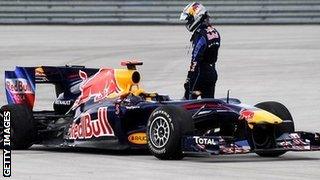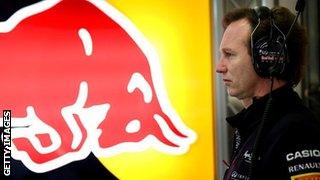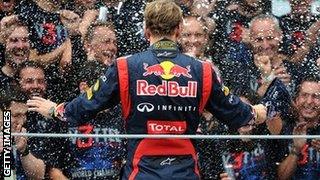Chinese Grand Prix: Webber & Vettel wounds have never healed
- Published
- comments
This weekend's Chinese Grand Prix will provide the first indication of how Red Bull drivers Mark Webber and Sebastian Vettel intend to handle the aftermath of the team orders row in Malaysia three weeks ago.
Red Bull have tried to draw a line under Vettel's decision to ignore team orders not to overtake Webber to win at Sepang. The two drivers have shaken hands and Vettel has apologised, both to Webber and the entire team.
Red Bull are hoping to put it behind them and get on with the business of trying to win their fourth consecutive drivers' and constructors' championship double.
But it is unlikely to be that simple. The wounds that were ripped open in Sepang had barely healed from the end of 2012, when Webber was asked to support Vettel's attempt to close out the title against Ferrari driver Fernando Alonso in Brazil and the team felt he was not only unhelpful, but obstructive.
And they have been festering for far longer than that - they go right back nearly three years to the 2010 Turkish Grand Prix.
The drama of Istanbul
Vettel and Webber headed into that race with a relationship that might best be characterised as one of "competitive tension", tied on points at the head of the championship, with Webber officially leading on account of his two wins to Vettel's one.
Subsequently, Red Bull would use championship position as a justification for one driver being favoured in one way or another over the other.
But in Turkey it was Vettel who was given the choice of two different rear wings that weekend and Webber who had to wait for the one that turned out to be faster to be shipped out just in time for qualifying.
Webber was slightly off Vettel's pace but ended up beating the German to pole position after the roll bar on Vettel's car broke.
In the race, with Webber leading from Vettel and the McLarens of Lewis Hamilton and Jenson Button closing fast, Vettel demanded to be let by, feeling Webber was too slow.
The situation was complicated by all four cars being short of fuel. Webber turned his engine down a lap before Vettel, which gave the German a chance to get a run on the Australian down the long back straight.
Webber defended vigorously, forcing Vettel to go for a gap on the inside no wider than his car. But while he was there, Vettel swerved into Webber, the two collided,, external Vettel was out of the race and Webber dropped back to third.
Disinterested observers felt Vettel was mostly at fault - but Red Bull motorsport chief Helmut Marko squarely blamed Webber, and team principal Christian Horner said the "larger fault" was with Webber for not giving his team-mate enough room.
The rest of 2010
In the aftermath of Turkey, Red Bull said they would allow the drivers to race freely. But in Canada two weeks later, Webber was told not to challenge Vettel, who was struggling with a gearbox problem.
Horner reasoned that had he allowed Webber to close and try to pass, Vettel would have been unable to resist fighting for his place, which would have finished off his gearbox and cost the team points.
The situation blew up again at Silverstone two races later. In final practice on Saturday morning, both men were trying a new front wing, of which there were only two. The one on Vettel's car broke and, for qualifying, the team decided to take the one from Webber's car and give it to Vettel, who took pole position by just 0.143 seconds.
Webber was furious.
The decision was justified by the fact that Vettel was ahead in the championship and had expressed a slightly stronger preference for it - and that it wasn't 'Webber's wing', so to speak, but a team wing and it was for them to decide what to do with it.
That justification was met with incredulity in the rest of the paddock.
"They did what?" asked one veteran technical boss, when the story was relayed to him. Another simply described Red Bull's actions as "ludicrous", adding: "To take it off one car and put it on another - I've never heard of that. Unless you have a clear number-one driver and a novice, in which case you'd give the number one both wings."
In the race the next day, Webber made a better start than Vettel, who tried to fight it out with his team-mate around the outside of Copse corner. He got a puncture and recovered to take seventh. Webber won and over the radio on the slowing down lap made his feelings clear. "Not bad for a number-two driver," he said.
Tension simmered for the rest of the year, with the two of them in title contention throughout.
Vettel inadvertently gifted Webber a win in Hungary, external when he let the gap between him and the safety car grow too big and was given a drive-through penalty.
In Japan, Webber felt he was faster than Vettel but was prevented from challenging for the win despite leading the championship with Vettel 21 points behind.
A week later in Korea, Vettel was pulling away in the rain in the early laps when Webber, trying to keep up, made a mistake and crashed.
Vettel later retired from the lead with an engine failure,, external gifting victory to Alonso, who also took the championship lead by 11 points from Webber. Vettel was now 25 points adrift with just two races to go.

Sebastian Vettel stands by his car after crashing out of Istanbul in 2010
Most felt that if Red Bull wanted to stop Alonso becoming champion they surely had to back Webber's title challenge and ask Vettel to back him up. But they refused, with team owner Dietrich Mateschitz saying they would rather lose the title in the right way than win it the wrong way.
That was a pointed reference to Ferrari's use of then-banned team orders to make Felipe Massa hand the lead of the German Grand Prix to Alonso. Mateschitz did not mention his own outfit's use of team orders.
Vettel did win the title, external - but only when a catastrophic strategic error by Ferrari in the final race in Abu Dhabi handed it to on Vettel on a plate. Without that, Alonso would have been champion.
Silverstone 2011
The events of 2010 hit Webber hard psychologically, and he suffered even more when in 2011 Vettel found a driving style that could maximise the effect of the team's trick exhaust-blown diffuser that Webber found counter-intuitive and difficult to copy.

Red Bull team principal Christian Horner has to manage the Vettel-Webber relationship
Vettel dominated the season, winning 11 races, with Webber's only victory in the final race in Brazil - and then only when Vettel's car hit trouble.
But at Silverstone in mid-season, the spectre of team orders arose again, when with exhaust-blown diffusers severely limited by a one-off rule change, Alonso took Ferrari's only win that year.
Behind him in the final laps, Webber was closing on Vettel, but was ordered to stay behind. He ignored the order and continued to challenge, unsuccessfully in the end.
Webber did not understand why in a season in which Vettel was clearly going to walk the title, he should not be allowed to race him that afternoon. Horner countered by saying - as he did in Malaysia this year - that he did not want to risk ending up with the two cars in the wall.
Last year
The two drivers were again closely matched in 2012, but Webber's title challenge faded through a series of technical issues in mid-summer and the fight came down to Vettel and Alonso.
At the final race of the year in Brazil, Horner and Marko asked Webber to forget about his own result and to help Vettel where possible.

Despite Vettel's jubilation in Brazil, he had jousted with Webber throughout
At the start, Webber squeezed Vettel towards the pit wall, and the German lost places at the first corner as a result. That put him in the midfield, where at Turn Four he turned in to Bruno Senna's Williams and spun into the middle of the track, an incident he was lucky his car survived.
Shortly afterwards, Webber appeared not to defend against Alonso. Later in the race, when Vettel caught him while fighting back through the field, Webber battled him for position rather than letting him go.
Horner and Marko were furious - and this is what prompted the controversial interview Marko gave to Red Bull's own magazine in which he made highly disparaging remarks about Webber.
That night, I met Webber in a café at Sao Paulo airport and made a joke about his battles with Vettel. He did not see the funny side. "Yeah, well," he said. "They didn't exactly lay it on a plate for me in 2010, did they?"
Now what?
To say Red Bull face an awkward situation between their drivers for the rest of the year would be an extreme understatement.
They have the fastest car, but one that works the tyres harder than its rivals from Ferrari, Mercedes and Lotus. They have two drivers both determined to win the championship, but an almost complete breakdown in trust between them.
In the aftermath of Malaysia, who really imagines Webber will be inclined to accede to team orders again, or to help Vettel in any way at all? And the long history of discontent almost certainly means that, for him, an apology - however heartfelt it may be - is unlikely to be enough.
Red Bull say the situation is "settled" and that the two men can continue to work together.
On an everyday level, in terms of engineering meetings and so on, that will be true. But out on the track may be another matter.
Given the apparent level of distrust and, in Webber's case, hurt and betrayal, it's hard to imagine that this story is over.
- Published10 April 2013
- Published28 March 2013
- Published24 March 2013
- Published24 March 2013